Memoir of John Shakespear Bartley, 1916-1919 - Part 9
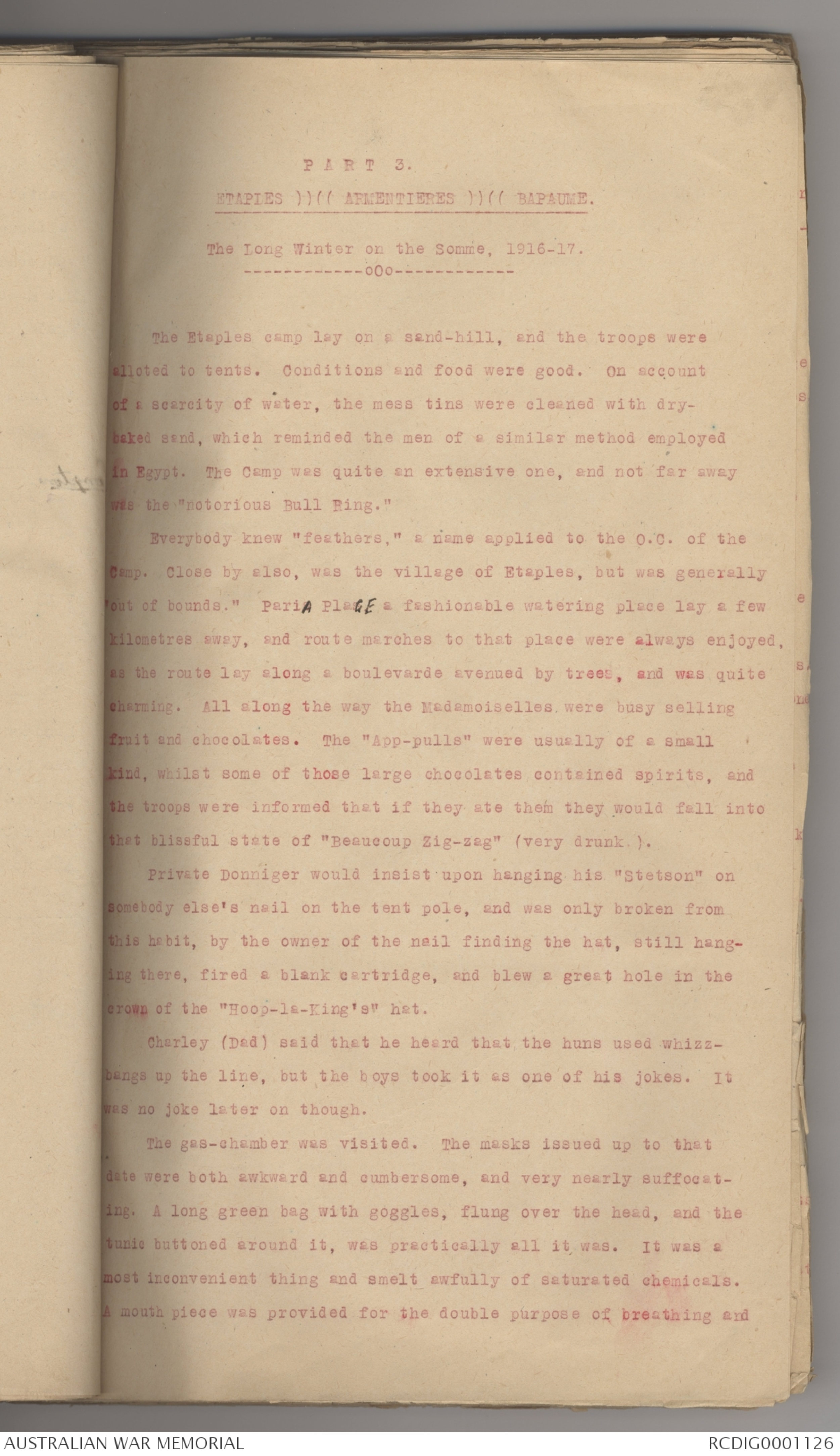
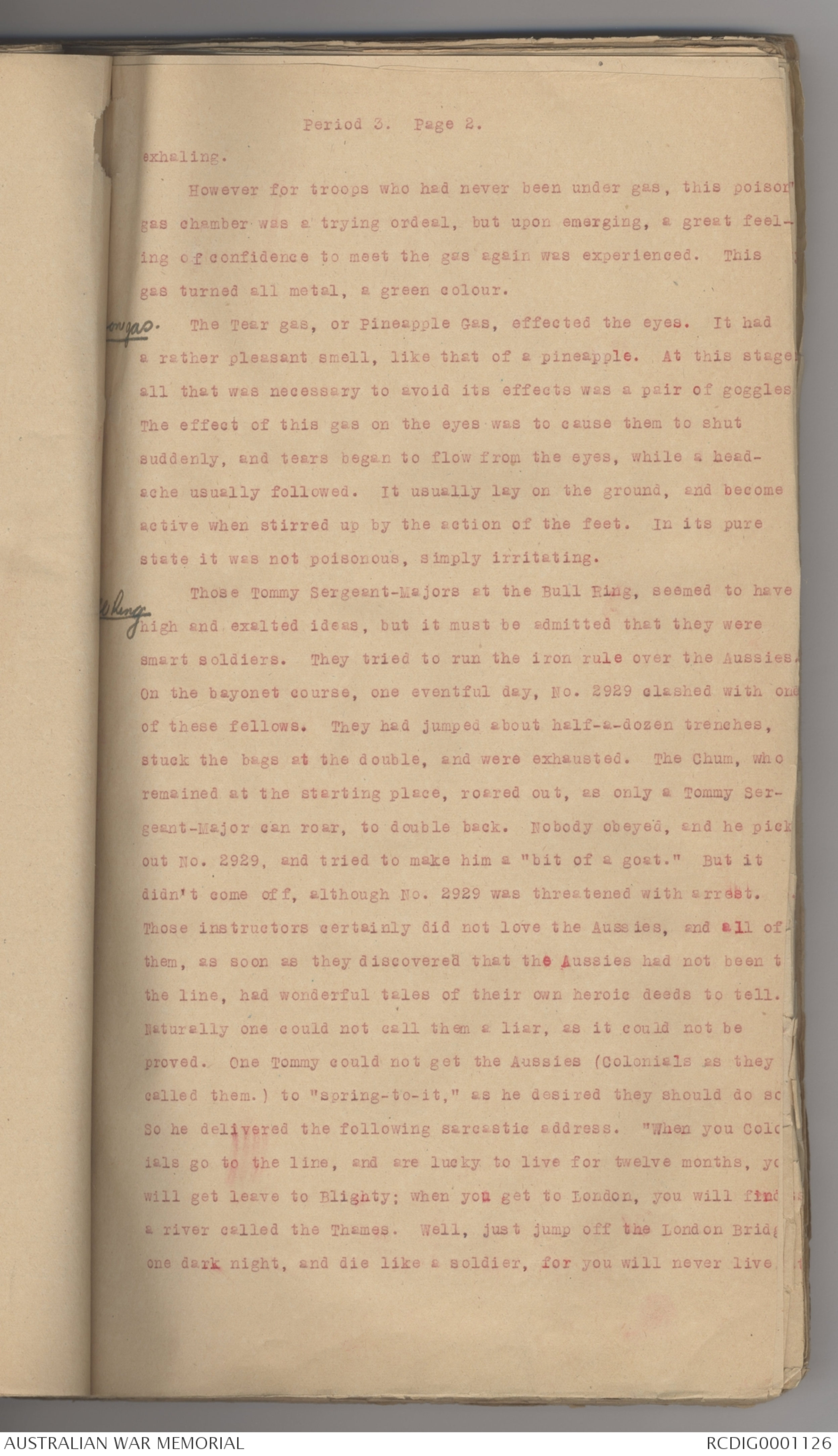
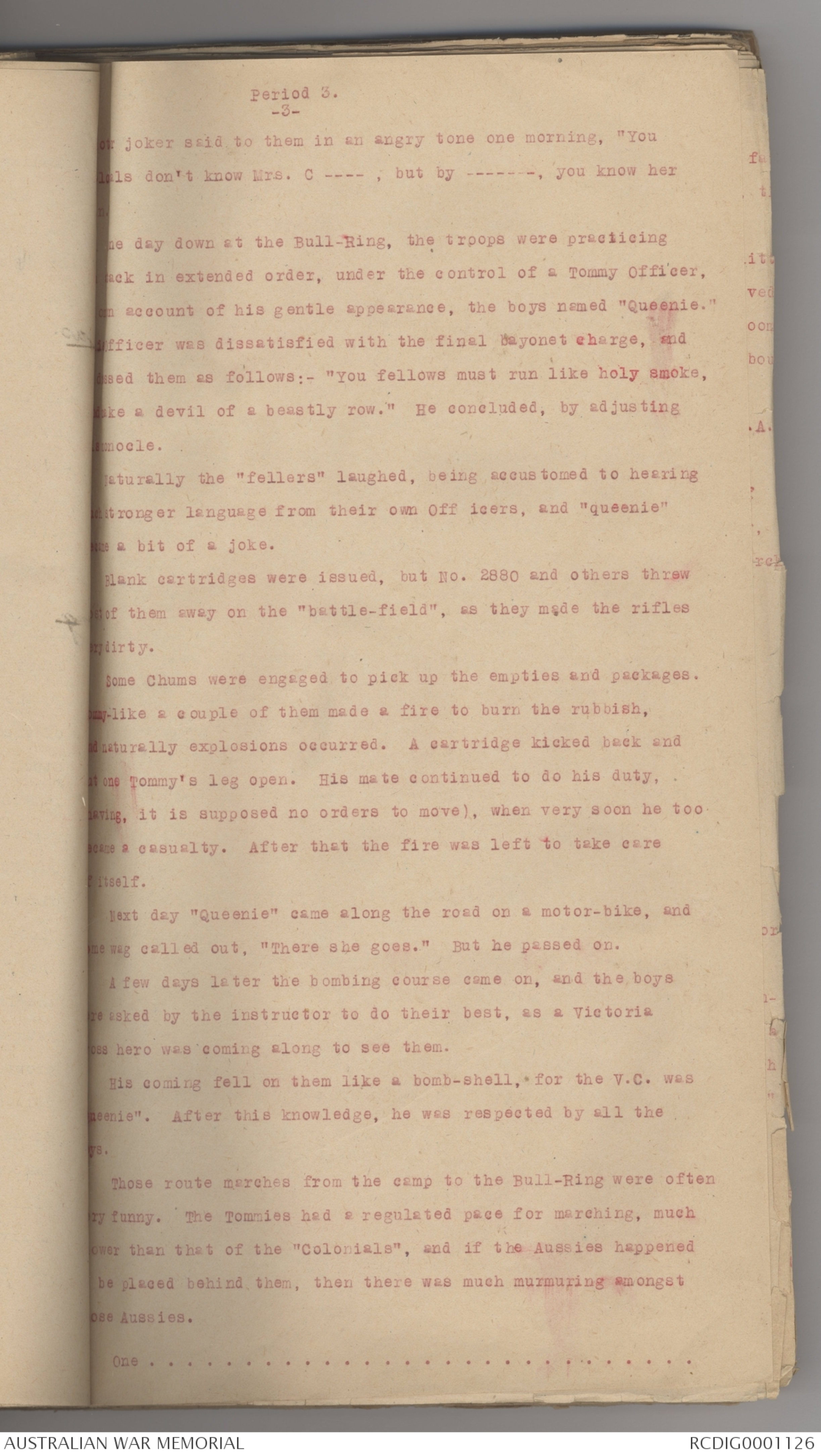
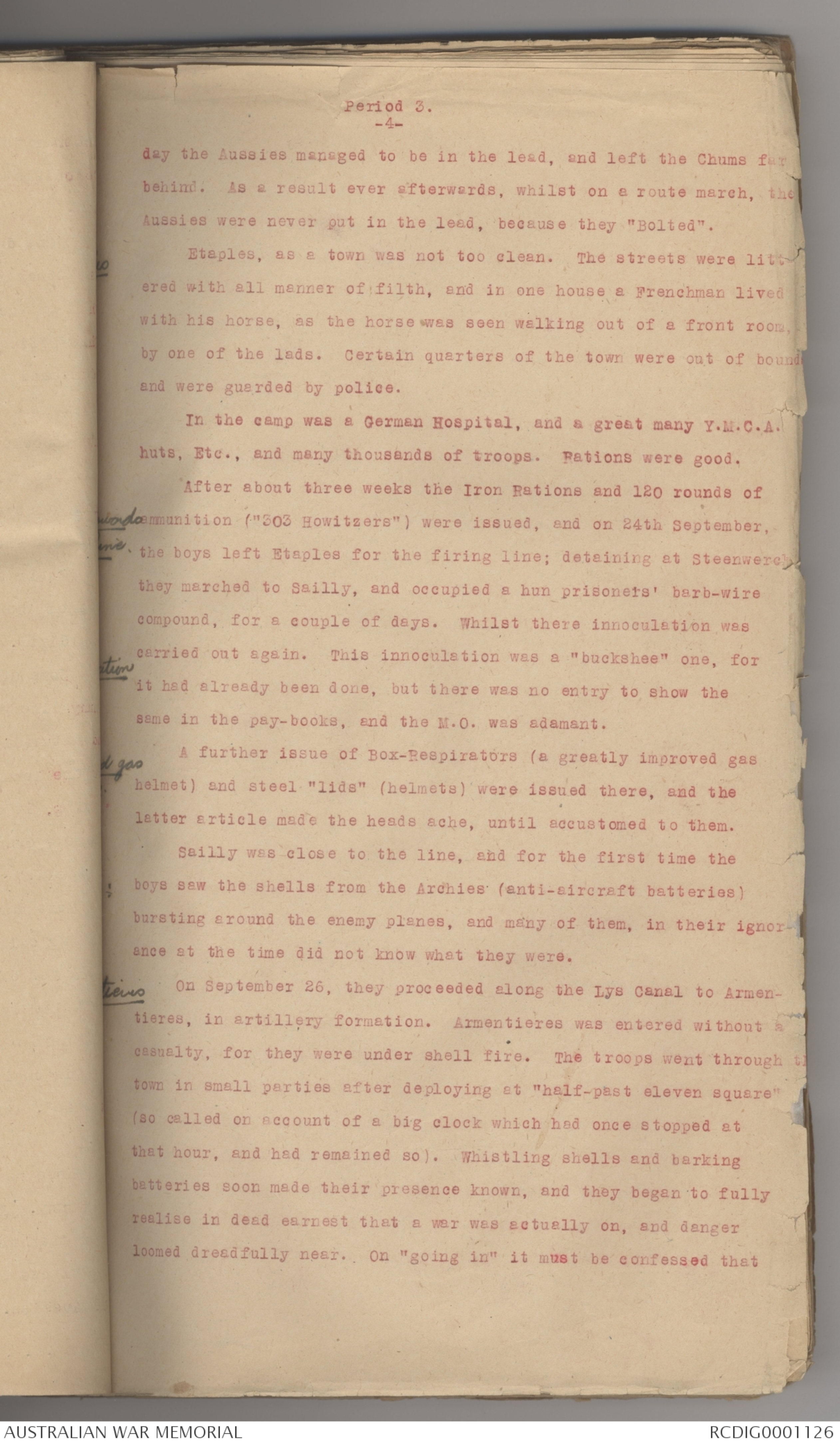
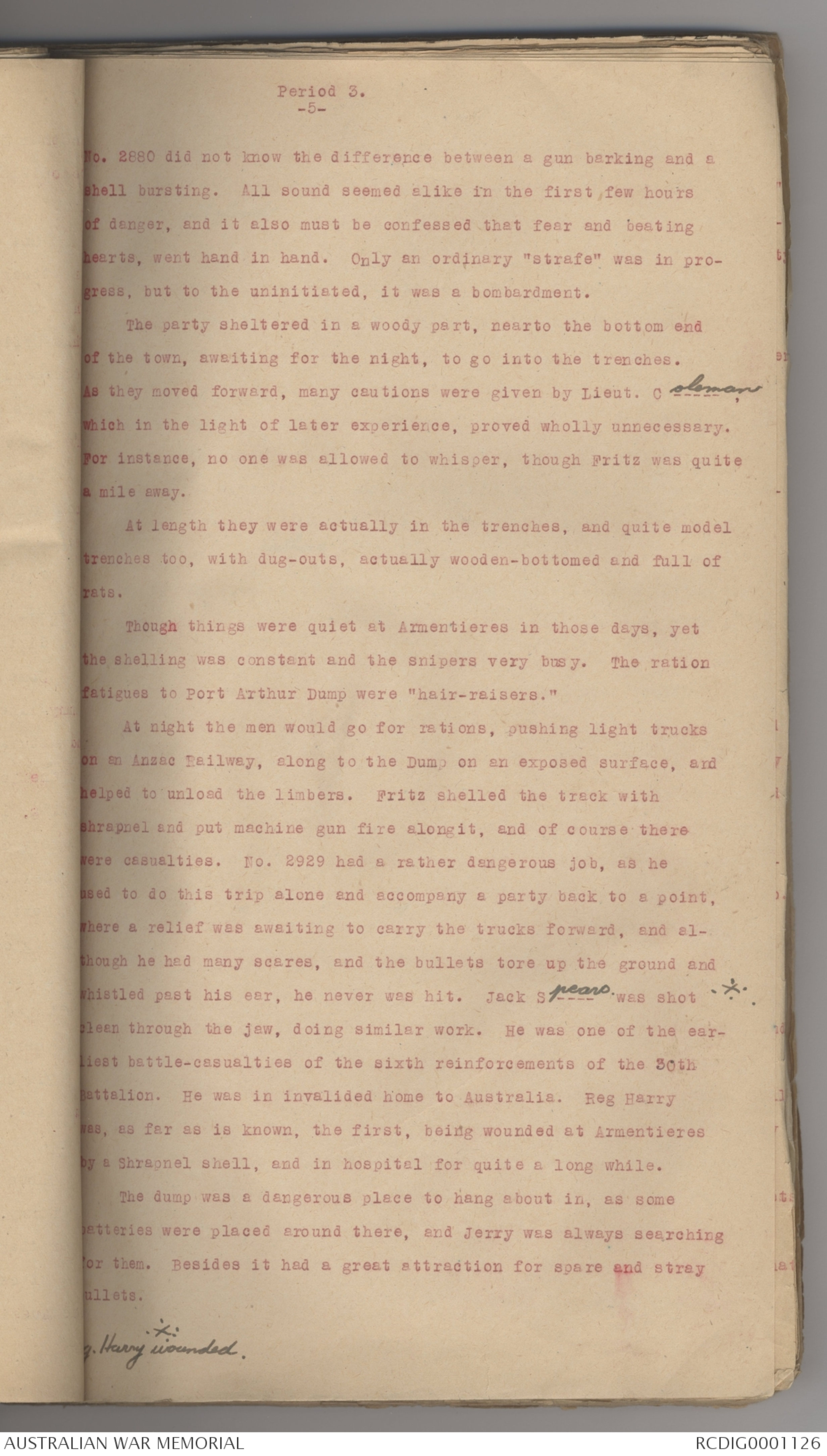
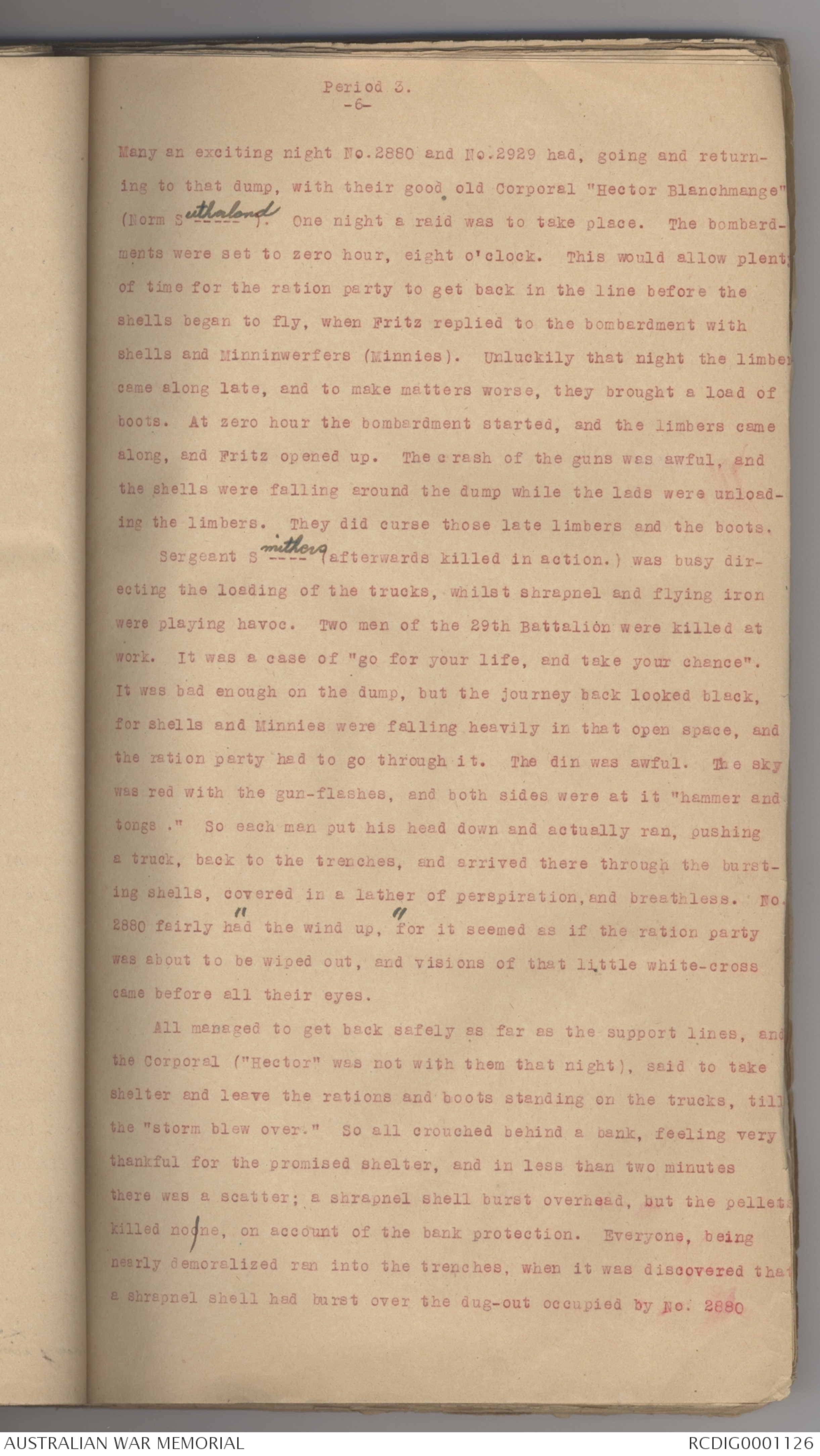
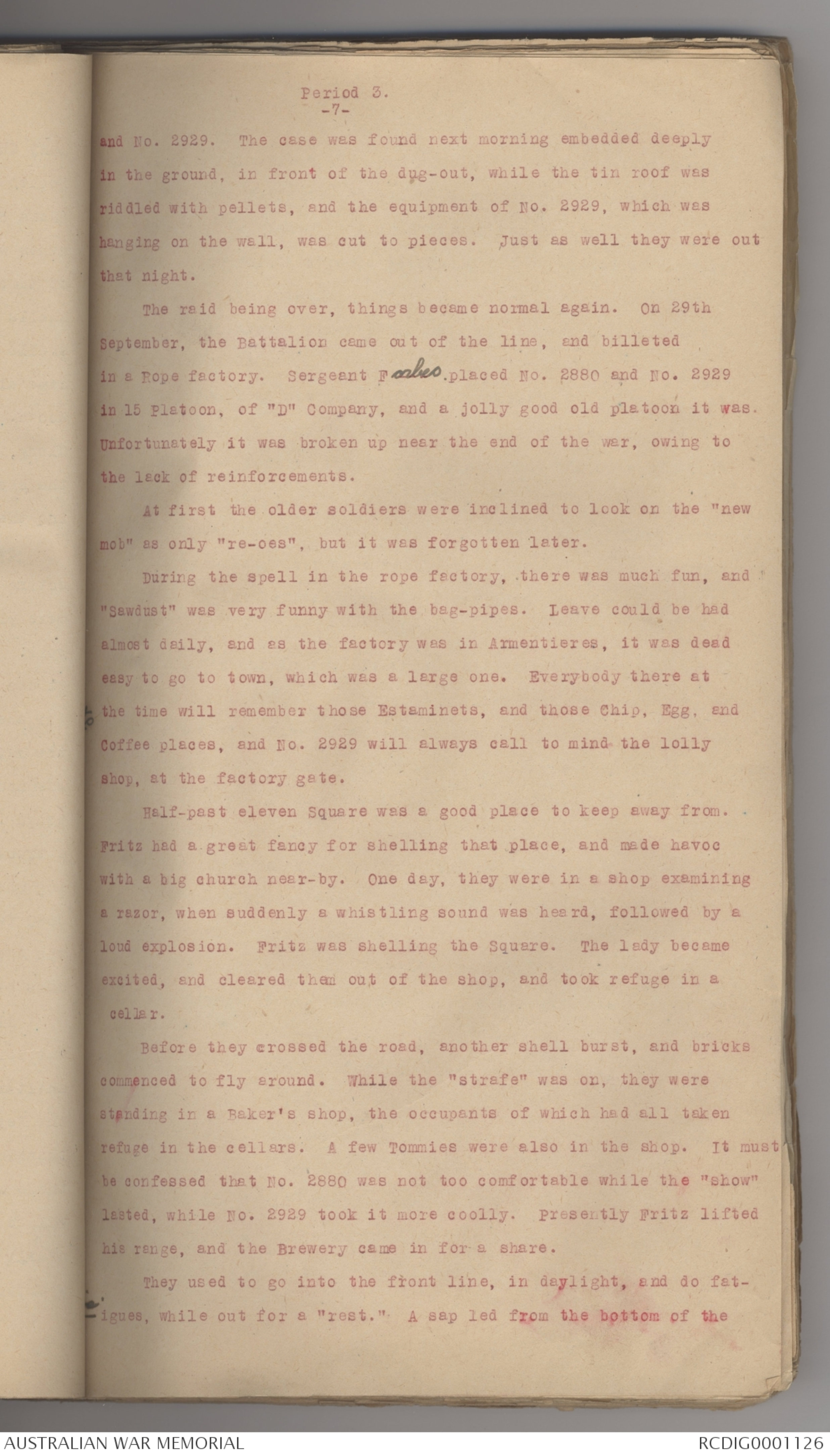
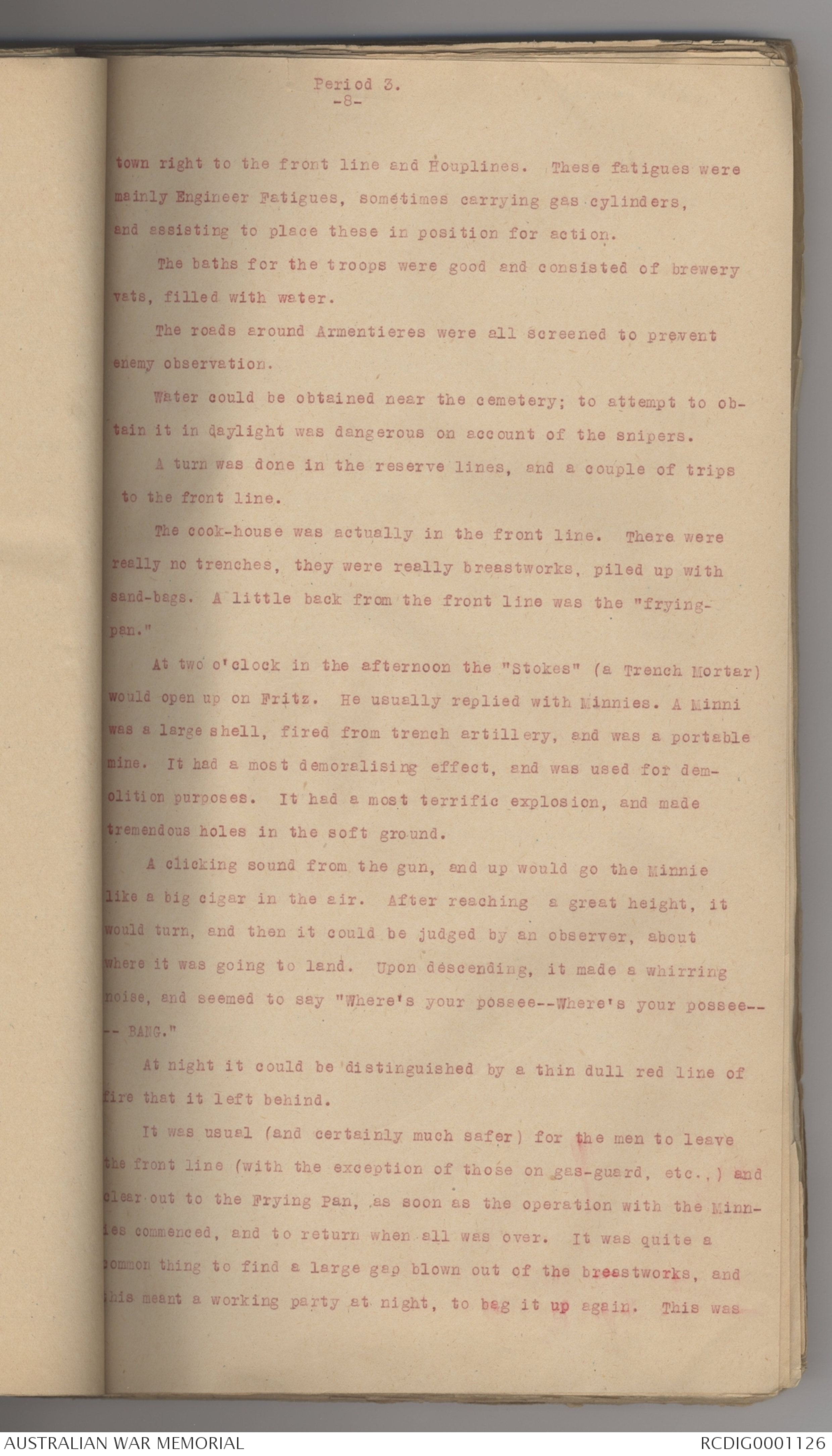
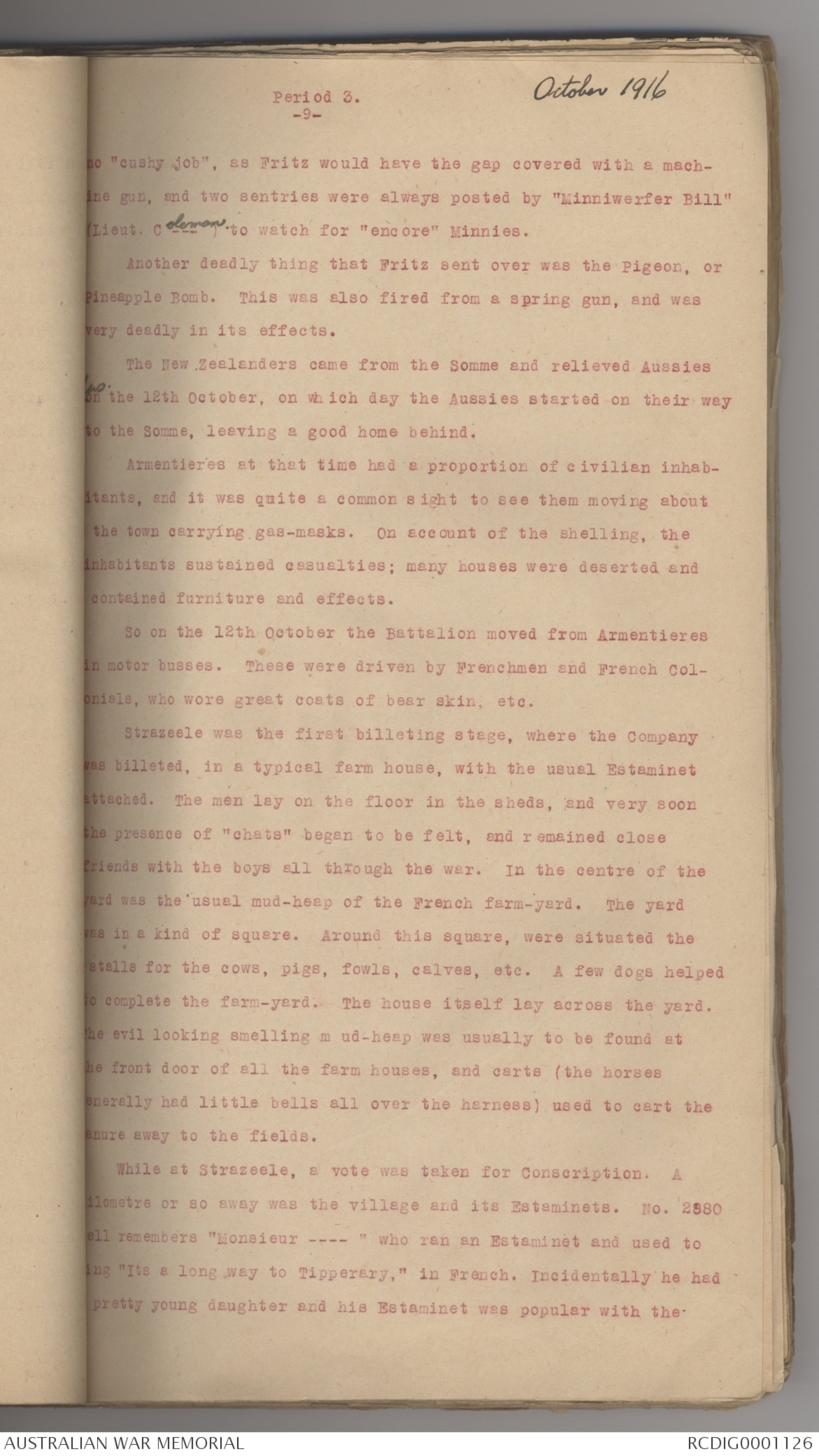
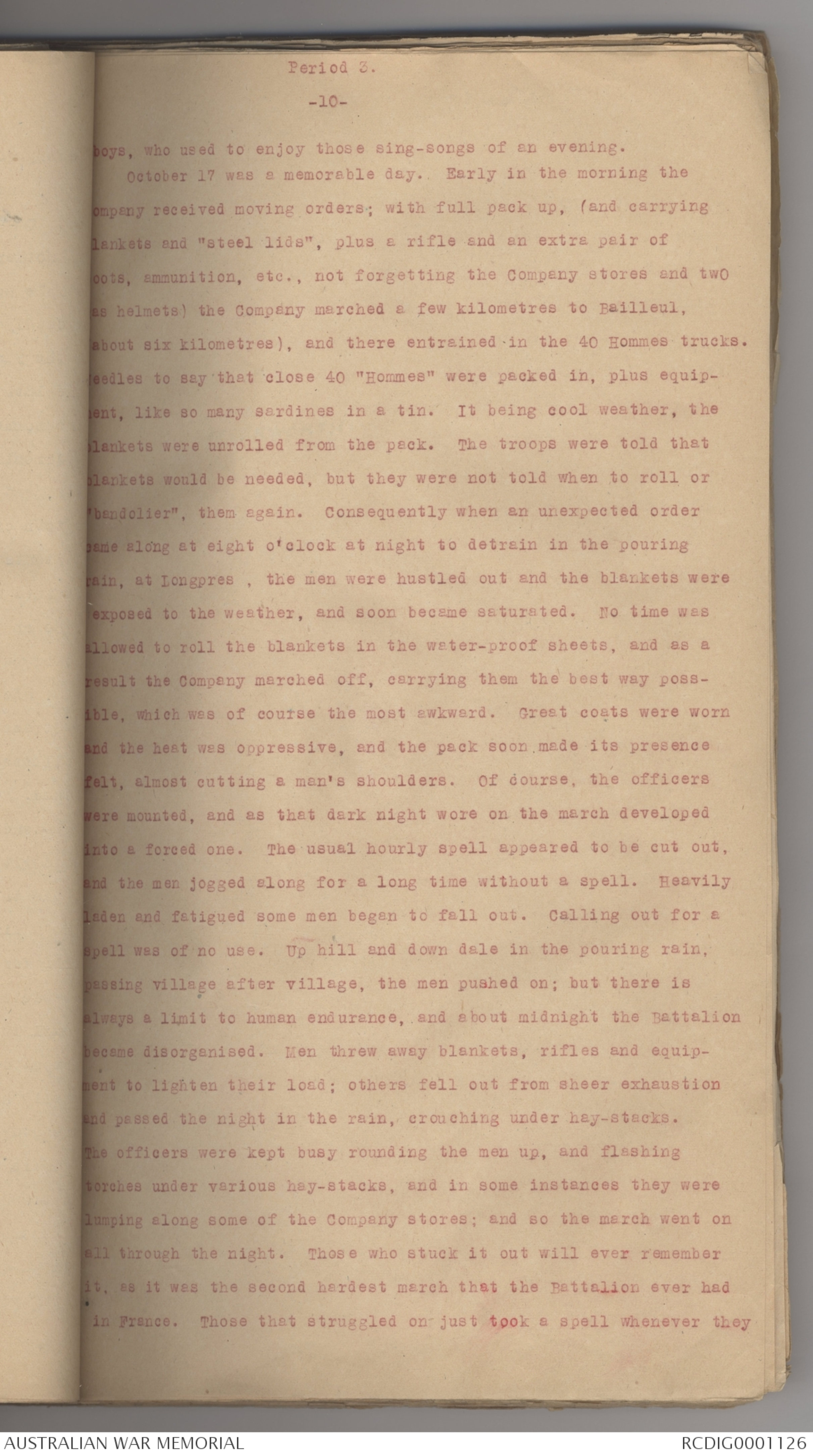
PART 3.
ETAPLES ) ) ( ( ARMENTIERES ) ) ( ( BAPAUME.
The Long Winter on the Somme, 1916-17.
--------------------o0o------------------
The Etaples camp lay on a sand-hill, and the troops were
alloted to tents. Conditions and food were good. on account
of a scarcity of water, the mess tins were cleaned with dry-
baked sand, which reminded the men of a similar method employed
in Egypt. The Camp was quite an extensive one, and not far away
was the "notorious Bull Ring."
Everybody knew "feathers," a name applied to the O.C. of the
camp. Close by also, was the village of Etaples, but was generally
out of bounds." Paria Plage a fashionable watering place lay a few
kilometres away, and route marches to that place were always enjoyed,
as the route lay along a boulevarde avenued by trees, and was quite
charming. All along the way the Madamoiselles were busy selling
fruit and chocolates. The "App-pulls" were usually of a small
kind, whilst some of those large chocolates contained spirits, and
the troops were informed that if they ate them they would fall into
that blissful state of "Beaucoup Zig-zag" (very drunk.).
Private Donniger would insist upon hanging his "Stetson" on
somebody else's nail on the tent pole, and was only broken from
this habit, by the owner of the nail finding the hat, still hanging
there, fired a blank cartridge, and blew a great hole in the
crown of the "Hoop-la-King's" hat.
Charley (Dad) said that he heard that the huns used whizz-
bangs up the line, but the boys took it as one of his jokes. It
was no joke later on though.
The gas-chamber was visited. The masks issued up to that
date were both awkward and cumbersome, and very nearly suffocating.
A long green bag with goggles, flung over the head, and the
tunic buttoned around it, was practically all it was. It was a
most inconvenient thing and smelt awfully of saturated chemicals.
A mouth piece was provided for the double purpose of breathing and
Period 3. Page 2.
exhaling.
However for troops who had never been under gas, this poison
gas chamber was a trying ordeal, but upon emerging, a great feeling
of confidence to meet the gas again was experienced. This
gas turned all metal, a green colour.
[*ongas.*]. Tear gas, or Pineapple Gas, effected the eyes. It had
a rather pleasant smell, like that of a pineapple. At this stage
all that was necessary to avoid its effects was a pair of goggles
The effect of this gas on the eyes was to cause them to shut
suddenly, and tears began to flow from the eyes, while a headache
usually followed. It usually lay on the ground, and become
active when stirred up by the action of the feet. In its pure
state it was not poisonous, simply irritating.
Those Tommy Sergeant-Majors at the Bull Ring, seemed to have
[*??ing] high and exalted ideas, but it must be admitted that they were
smart soldiers. They tried to run the iron rule over the Aussies.
On the bayonet course, one eventful day, No. 2929 clashed with one
of these fellows. They had jumped about half-a-dozen trenches,
stuck the bags at the double, and were exhausted. The Chum, who
remained at the starting place, roared out, as only a Tommy
Sergeant-Major can roar, to double back. Nobody obeyed, and he pick
out No. 2929, and tried to make him a "bit of a goat." But it
didn't come off, although No. 2929 was threatened with arrest.
Those instructors certainly did not love the Aussies, and all of
them, as soon as they discovered that the Aussies had not been t
the line, had wonderful tales of their own heroic deeds to tell.
Naturally one could not call them a liar, as it could not be
proved. One Tommy could not get the Aussies (Colonials as they
called them.) to "spring-to-it," as he desired they should do so
So he delivered the following sarcastic address. "When you
Colonials go to the line, and are lucky to live for twelve months, yo
will get leave to Blighty; when you get to London, you will find
a river called the Thames. Well, just jump off the London Bridg
one dark night, and die like a soldier, for you will never live
Period 3.
-3-
[[our]] joker said to them in an angry tone one morning, "You
[[als]] don't know Mrs. C ----; but by -------, you know her
The day down at the Bull-Ring, the troops were practicing
[[?attack]] in extended order, under the control of a Tommy Officer,
[[?]] on account of his gentle appearance, the boys named "Queenie.
[[?ficer]] was dissatisfied with the final bayonet charge, and
[[addressed]] them as follows:- "You fellows must run like holy smoke,
[[?]] make a devil of a beastly row." He concluded, by adjusting
[[his?]] monocle.
Naturally the "fellers" laughed, being accustomed to hearing
stronger language from their own Off icers, and "queenie"
was a bit of a joke.
Blank cartridges were issued, but No. 2880 and others threw
all of them away on the "battle-field", as they made the rifles
[[very?]]dirty.
Some Chums were engaged to pick up the empties and packages.
[[?]]-like a couple of them made a fire to burn the rubbish,
Naturally explosions occurred. A cartridge kicked back and
[[cut]] one Tommy's leg open. His mate continued to do his duty,
(having, it is supposed no orders to move), when very soon he too
became a casualty. After that the fire was left to take care
itself.
Next day "Queenie" came along the road on a motor-bike, and
the wag called out, "There she goes." But he passed on.
A few days later the bombing course came on, and the boys
were asked by the instructor to do their best, as a Victoria
Cross hero was coming along to see them.
His coming fell on them like a bomb-shell, for the V.C. was
"Queenie". After this knowledge, he was respected by all the
[[boys.]]
Those route marches from the camp to the Bull-Ring were often
[[very]] funny. The Tommies had a regulated pace for marching, much
slower than that of the "Colonials", and if the Aussies happened
to be placed behind them, then there was much murmuring amongst
those Aussies.
One . . . . . . . . . . . . . . . . . . . . . . . . . . . . . . . . . . . . . . . . . . . . . . . . . . . . . . . . .
Period 3.
-4-
day the Aussies managed to be in the lead, and left the Chums far
behind. As a result ever afterwards, whilst on a route march, the
Aussies were never put in the lead, because they "Bolted".
[*?*] Etaples, as a town was not too clean. The streets were littered
with all manner of filth, and in one house a Frenchman lived
with his horse, as the horse was seen walking out of a front room,
by one of the lads. Certain quarters of the town were out of bounds
and were guarded by police.
In the camp was a German Hospital, and a great many Y.M.C.A.
huts, Etc., and many thousands of troops. Rations were good.
After about three weeks the Iron Rations and 120 rounds of
[*?]ammunition ("303 Howitzers") were issued, and on 24th September,
[*?*]. the boys left Etaples for the firing line; detaining at Steenwerch
they marched to Sailly, and occupied a hun prisoners' barb-wire
compound, for a couple of days. Whilst there innoculation was
carried out again. This innoculation was a "buckshee" one, for
[*?*] it had already been done, but there was no entry to show the
same in the pay-books, and the M.0. was adamant.
[*gas*]A further issue of Box-Respirators (a greatly improved gas
helmet) and steel "lids" (helmets) were issued there, and the
latter article made the heads ache, until accustomed to them.
Sailly was close to the line, and for the first time the
boys saw the shells from the Archies (anti-aircraft batteries)
bursting around the enemy planes, and many of them, in their
ignorance at the time did not know what they were.
[*tiers?*] On September 26, they proceeded along the Lys Canal to
Armentieres, in artillery formation. Armentieres was entered without å
casualty, for they were under shell fire. The troops went through th
town in small parties after deploying at "half-past eleven square"
(so called on account of a big clock which had once stopped at
that hour, and had remained so). Whistling shells and barking
batteries soon made their presence known, and they began to fully
realise in dead earnest that a war was actually on, and danger
loomed dreadfully near. On "going in" it must be confessed that
Period 3.
-5-
No. 2880 did not know the difference between a gun barking and a
shell bursting. All sound seemed alike in the first few hours
of danger, and it also must be confessed that fear and beating
hearts, went hand in hand. Only an ordinary "strafe" was in
progress, but to the uninitiated, it was a bombardment.
The party sheltered in a woody part, near to the bottom end
of the town, awaiting for the night, to go into the trenches.
As they moved forward, many cautions were given by Lieut. Coleman
which in the light of later experience, proved wholly unnecessary.
For instance, no one was allowed to whisper, though Fritz was quite
a mile away.
At length they were actually in the trenches, and quite model
trenches too, with dug-outs, actually wooden-bottomed and full of
rats.
Though things were quiet at Armentieres in those days, yet
the shelling was constant and the snipers very busy. The ration
fatigues to Port Arthur Dump were "hair-raisers."
At night the men would go for rations, pushing light trucks
on an Anzac Railway, along to the Dump, on an exposed surface, and
helped to unload the limbers. Fritz shelled the track with
shrapnel and put machine gun fire along it, and of course there
were casualties. No. 2929 had a rather dangerous job, as he
used to do this trip alone and accompany a party back to a point,
where a relief was awaiting to carry the trucks forward, and although
he had many scares, and the bullets tore up the ground and
whistled past his ear, he never was hit. Jack Spears was shot .x.
clean through the jaw, doing similar work. He was one of the
earliest battle-casualties of the sixth reinforcements of the 30th
Battalion. He was in invalided home to Australia. Reg Harry
was, as far as is known, the first, being wounded at Armentieres
by a Shrapnel shell, and in hospital for quite a long while.
The dump was a dangerous place to hang about in, as some
batteries were placed around there, and Jerry was always searching
for them. Besides it had a great attraction for spare and stray
bullets.
[*g. Harry wounded .X.*]
Period 3.
-6-
Many an exciting night No.2880 and No.2929 had, going and returning
to that dump, with their good old Corporal "Hector Blanchmange"
(Norm Sutherland). One night a raid was to take place. The bombardments
were set to zero hour, eight o'clock. This would allow plenty
of time for the ration party to get back in the line before the
shells began to fly, when Fritz replied to the bombardment with
shells and Minninwerfers (Minnies). Unluckily that night the limbers
came along late, and to make matters worse, they brought a load of
boots. At zero hour the bombardment started, and the limbers came
along, and Fritz opened up. The crash of the guns was awful, and
the shells were falling around the dump while the lads were unloading
the limbers. They did curse those late limbers and the boots.
Sergeant Smithers (afterwards killed in action.) was busy directing
the loading of the trucks, whilst shrapnel and flying iron
were playing havoc. Two men of the 29th Battalion were killed at
work. It was a case of "go for your life, and take your chance".
1t was bad enough on the dump, but the journey back looked black,
for shells and Minnies were falling heavily in that open space, and
the ration party had to go through it. The din was awful. The sky
was red with the gun-flashes, and both sides were at it "hammer and
tongs ." So each man put his head down and actually ran, pushing
a truck, back to the trenches, and arrived there through the bursting
shells, covered in a lather of perspiration, and breathless. No.
2880 fairly "had the wind up", for it seemed as if the ration party
was about to be wiped out, and visions of that little white-cross
came before all their eyes.
All managed to get back safely as far as the support lines, and
the Corporal ("Hector" was not with them that night), said to take
shelter and leave the rations and boots standing on the trucks, till
the "storm blew over." So all crouched behind a bank, feeling very
thankful for the promised shelter, and in less than two minutes
there was a scatter; a shrapnel shell burst overhead, but the pellets
tilled nodne, on account of the bank protection. Everyone, being
nearly demoralized ran into the trenches, when it was discovered that
a shrapnel shell had burst over the dug-out occupied by No. 2880
Period 3.
-7-
and No. 2929. The case was found next morning embedded deeply
in the ground, in front of the dug-out, while the tin roof was
riddled with pellets, and the equipment of No. 2929, which was
banging on the wall, was cut to pieces. Just as well they were out
that night.
The raid being over, things became normal again. On 29th
September, the Battalion came out of the line, and billeted
in a Rope factory. Sergeant Forbes placed No. 2880 and No. 2929
in 15 Platoon, of "D" Company, and a jolly good old platoon it was.
Unfortunately it was broken up near the end of the war, owing to
the lack of reinforcements.
At first the older soldiers were inclined to look on the "new
mob" as only "re-oes", but it was forgotten later.
During the spell in the rope factory, there was much fun, and
'Sawdust" was very funny with the bag-pipes. Leave could be had
almost daily, and as the factory was in Armentieres, it was dead
easy to go to town, which was a large one. Everybody there at
the time will remember those Estaminets, and those Chip, Egg, and
Coffee places, and No. 2929 will always call to mind the lolly
shop, at the factory gate.
Half-past eleven Square was a good place to keep away from.
Fritz had a great fancy for shelling that place, and made havoc
with a big church near-by. One day, they were in a shop examining
a razor, when suddenly a whistling sound was heard, followed by a
loud explosion. Fritz was shelling the Square. The lady became
excited, and cleared them out of the shop, and took refuge in a
cellar.
Before they crossed the road, another shell burst, and bricks
commenced to fly around. While the "strafe" was on, they were
standing in a Baker's shop, the occupants of which had all taken
refuge in the cellars. A few Tommies were also in the shop. It must
be confessed that No. 2880 was not too comfortable while the "show"
lasted, while No. 2929 took it more coolly. Presently Fritz lifted
range, and the Brewery came in for a share.
They used to go into the front line, in daylight, and do fatigues,
[*?*]while out for a "rest." A sap led from the bottom of the
Period 3.
-8-
town right to the front line and Houplines. These fatigues were
mainly Engineer Fatigues, sometimes carrying gas cylinders,
and assisting to place these in position for action.
The baths for the troops were good and consisted of brewery
vats filled with water.
The roads around Armentieres were all screened to prevent
enemy observation.
Water could be obtained near the cemetery; to attempt to obtain
it in daylight was dangerous on account of the snipers.
A turn was done in the reserve lines, and a couple of trips
to the front line.
The cook-house was actually in the front line. There were
really no trenches, they were really breastworks, piled up with
sand-bags. A little back from the front line was the "frying-
pan."
At two o'clock in the afternoon the "Stokes" (a Trench Mortar)
would open up on Fritz. He usually replied with Minnies. A Minni
is a large shell, fired from trench artillery, and was a portable
mine. It had a most demoralising effect, and was used for
demolition purposes. It had a most terrific explosion, and made
tremendous holes in the soft ground.
A clicking sound from the gun, and up would go the Minnie
like a big cigar in the air. After reaching a great height, it
would turn, and then it could be judged by an observer, about
where it was going to land. Upon descending, it made a whirring
noise, and seemed to say "Where's your possee--Where's your possee--
---BANG."
At night it could be distinguished by a thin dull red line of
fire that it left behind.
It was usual (and certainly much safer) for the men to leave
the front line (with the exception of those on gas-guard, etc.,) and
clear out to the Frying Pan, as soon as the operation with the Minnies
commenced, and to return when all was over. It was quite a
common thing to find a large gap blown out of the breastworks, and
this meant a working party at night, to bag it up again. This was
October 1916
Period 3.
-9-
no "cushy job", as Fritz would have the gap covered with a machine
gun, and two sentries were always posted by "Minniwerfer Bill
Lieut. Colman to watch for "encore" Minnies.
Another deadly thing that Fritz sent over was the Pigeon, or
Pineapple Bomb. This was also fired from a spring gun, and was
very deadly in its effects.
The New Zealanders came from the Somme and relieved Aussies
[*?*] on the 12th October, on which day the Aussies started on their way
to the Somme, leaving a good home behind.
Armentieres at that time had a proportion of civilian inhabitants,
and it was quite a common sight to see them moving about
the town carrying gas-masks. On account of the shelling, the
inhabitants sustained casualties; many houses were deserted and
contained furniture and effects.
So on the 12th October the Battalion moved from Armentieres
motor busses. These were driven by Frenchmen and French
Colonials, who wore great coats of bear skin, etc.
Strazeele was the first billeting stage, where the Company
was billeted, in a typical farm house, with the usual Estaminet
attached. The men lay on the floor in the sheds, and very soon
the presence of "chats" began to be felt, and remained close
friends with the boys all through the war. In the centre of the
yard was the usual mud-heap of the French farm-yard. The yard
sits in a kind of square. Around this square, were situated the
stalls for the cows, pigs, fowls, calves, etc. A few dogs helped
to complete the farm-yard. The house itself lay across the yard.
The evil looking smelling m ud-heap was usually to be found at
front door of all the farm houses, and carts (the horses
generally had little bells all over the harness) used to cart the
manure away to the fields.
While at Strazeele, a vote was taken for Conscription. A
kilometre or so away was the village and its Estaminets. No. 2880
still remembers "Monsieur ---- " who ran an Estaminet and used to
sing "Its a long way to Tipperary," in French. Incidentally he had
young daughter and his Estaminet was popular with the
Period 3.
-10-
boys, who used to enjoy those sing-songs of an evening.
October 17 was a memorable day. Early in the morning the
company received moving orders; with full pack up, (and carrying
blankets and "steel lids", plus a rifle and an extra pair of
boots, ammunition, etc., not forgetting the Company stores and tw0
[[?as]] helmets) the Company marched a few kilometres to Bailleul,
about six kilometres), and there entrained in the 40 Hommes trucks.
Needles to say that close 40 "Hommes" were packed in, plus equipment,
like so many sardines in a tin. It being cool weather, the
blankets were unrolled from the pack. The troops were told that
blankets would be needed, but they were not told when to roll or
"bandolier", them again. Consequently when an unexpected order
came along at eight o'clock at night to detrain in the pouring
rain at Longpres, the men were hustled out and the blankets were
exposed to the weather, and soon became saturated. No time was
allowed to roll the blankets in the water-proof sheets, and as a
result, the Company marched off, carrying them the best way
possible, which was of course the most awkward. Great coats were worn
the heat was oppressive, and the pack soon made its presence
felt, almost cutting a man's shoulders. Of course, the officers
were mounted, and as that dark night wore on the march developed
into a forced one. The usual hourly spell appeared to be cut out,
and the men jogged along for a long time without a spell. Heavily
laden and fatigued some men began to fall out. Calling out for a
spell was of no use. Up hill and down dale in the pouring rain,
passing village after village, the men pushed on; but there is
always a limit to human endurance, and about midnight the Battalion
became disorganised. Men threw away blankets, rifles and equipment
to lighten their load; others fell out from sheer exhaustion
and passed the night in the rain, crouching under hay-stacks.
The officers were kept busy rounding the men up, and flashing
torches under various hay-stacks, and in some instances they were
lumping along some of the Company stores; and so the march went on
all through the night. Those who stuck it out will ever remember
it, as it was the second hardest march that the Battalion ever had
in France. Those that struggled on just took a spell whenever they
 JayB
JayBThis transcription item is now locked to you for editing. To release the lock either Save your changes or Cancel.
This lock will be automatically released after 60 minutes of inactivity.